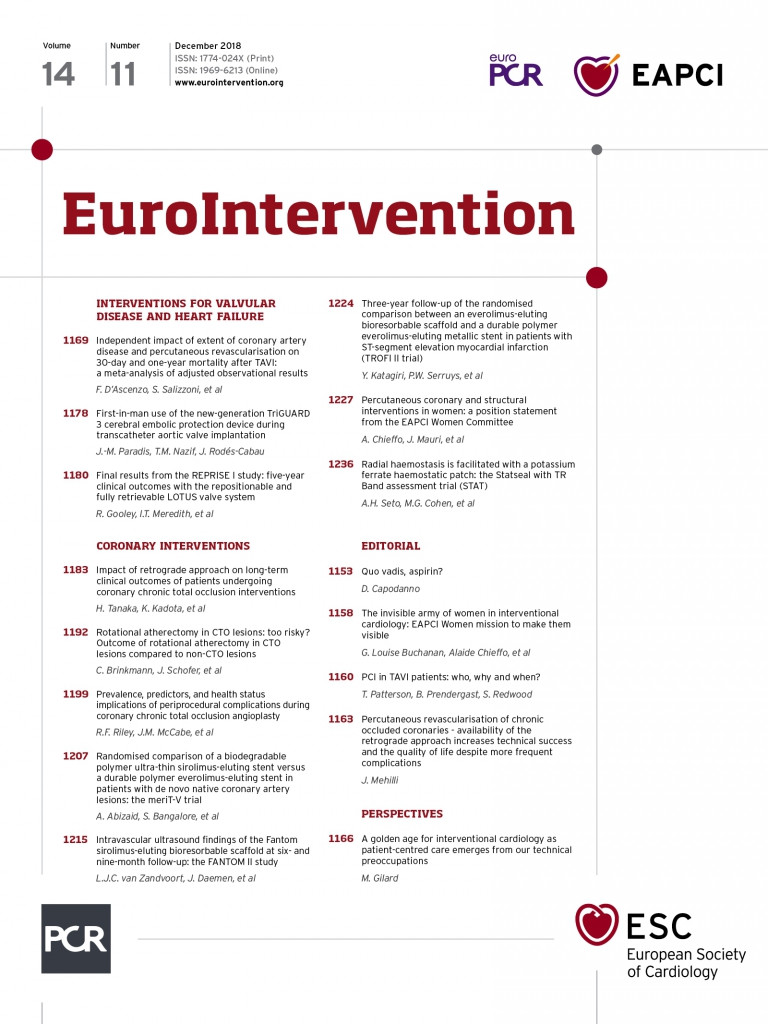
The recent EuroPCR meeting held in Paris in May of this year once again demonstrated the vast talent within interventional cardiology, displaying the incredible dedication and commitment that many individuals contribute to this important and exciting field. However, there was a very small representation of women as presenters, faculty or live case operators, with only 79 female faculty members, equivalent to the 78 who were faculty members at EuroPCR 2016. This is despite the evidence that there are growing numbers of female interventional cardiologists in many countries across Europe. For example, in Italy, women constitute 26% of all practising interventional cardiologists according to the Italian Society of Interventional Cardiology (GISE) compared to only 5.7% female interventional cardiologists in the UK, as per the British Cardiovascular Intervention Society audit data. There is therefore an “invisible/secret army” of women out there, who are working conscientiously to attain more senior leadership roles, albeit with a lack of deserved recognition from the outside academic and professional world.
In the edition of EuroIntervention accompanying EuroPCR this year, in an Editorial entitled “Re-shuffling the Editorial Board”, Editor-in-Chief Professor Patrick Serruys brought much needed attention to this important issue1.
It is also surprising that women interventional cardiologists are considered a “secret society” in spite of repeated efforts and engagements in past years from the EAPCI Women Committee and with the publication in this issue of EuroIntervention of the position paper from the EAPCI Women Committee featuring all our members2.
Whether the efforts have been insufficient, or the community as a whole is not yet used to or does not accept that women interventionalists are strong contributors in equal measure to their male colleagues, remains unknown. In addition, in the same editorial1, the success of women in the field, able to combine family life alongside professional responsibilities, was acknowledged. Many women who choose a career in interventional cardiology give up a family life because of the difficulties in pursuing professional success, with the necessary work-life balance men can reach often denied to women3.
Interventional cardiology has long been acknowledged as requiring significant commitment through long and unsociable hours and presenting challenges in maintaining the necessary work life balance, which of course is important to many individuals. However, other contributory factors have included a lack of women in more senior and “public” roles to act as role models. Professor Roxana Mehran, Mount Sinai School of Medicine, New York, NY, USA, a strong advocate for women in interventional cardiology, has striven to gain awareness and equality. In correspondence received from Professor Mehran, she emphasised that women are not choosing interventional cardiology as a career due to under-representation; it needs to be our mission as a community to change this and move things forward. Therefore, the lack of women in visible positions at major international meetings, including EuroPCR, contributes to those talented young women perhaps choosing an alternative career path. A further recent editorial by Professor Mehran concludes that we must all act to encourage talented women to become interventional cardiologists, or nothing will change4.
Of note, in recent months huge progress has been made to address some of these issues. There are more women now included in the EuroIntervention Editorial Board (51 out of 257 members; 20%) and the current EAPCI board, led by EAPCI President Professor Andreas Baumbach, comprises 35% women (11 out of 31 members), with 42% (10 out of 24) of the committee chairs and co-chairs being women. For the first time this year, the EAPCI board have voted that 50% of the interventional fellowship grants will be awarded to women, acknowledging the importance of equality in education. To this end, the EAPCI Women Committee (Appendix) has the mission statement to attain sex equality at both the professional and the patient level. There has been a call for increased “equality” across all areas of society and this has been prominent in the public eye in recent years. Women interventional cardiologists are no different and no exception, and we will continue to strive to gain this building on from the dedicated work of Dr Josepa Mauri and Dr Maria Radu (Chair and Co-Chair 2016-2018). Throughout the EAPCI term 2018-2020, there will be a strong emphasis from the group on career mentoring and education, with interventional cardiology being promoted as a positive career choice for women, with the opportunity for those in training to interact with leaders in the field for mentorship, professional guidance and support. Furthermore, for those individuals who are moving forward in their careers, prominence will be given to professional development and networking, by continuing to improve the participation of women in interventional meetings and supporting entry into developmental/leadership programmes, for example, “Women Transforming Leadership”, that has been successfully supported by the European Society of Cardiology. Therefore, as a whole community, it is essential that we work together to support and promote these gifted and enthusiastic women who have so much to give to our fantastic specialty in the future. These are just small steps; nevertheless, let us march together to make this invisible/secret army of women interventional cardiologists visible!
Appendix
Members of the EAPCI Women Steering Committee 2018-2020: Dr Alaide Chieffo, Chair; Dr Louise Buchanan, Co-Chair; Dr Maria Radu; Prof. Stephanie Schupke; Dr Lene Holmvang; Prof. Stefan James; Dr Stephane Manzo-Silberman; Dr Emanuela Piccaluga; Dr Ghada Mikhail; Dr Patrizia Presbitero; Dr Vijay Kunadian; Dr Nicole Karam; Dr Marie-Claude Morice; Dr Evelyn Regar; Dr Rasha Al-Lamee; Dr Anna-Sonia Franzone; Dr Chiara Fraccaro; Dr Neus Salvatella; Dr Linda Souza; Dr Mirvat Alasnag; Dr Giovanna Sarno; Dr Nicolas Amabile; Dr Marta Kaluzna-Oleksy.
Conflict of interest statement
The authors have no conflicts of interest to declare.
Extract from Serruys PW. Re-Shuffling the Editorial Board. EuroIntervention. 2018;14:15-7.
| In closing, I must confess that I recently wondered who these female cardiologists really were. I wrote to the ESC requesting a list of female interventional cardiologists who were members of the EAPCI and was somewhat surprised by the response which stated that, due to data protection in France, they were unable to disclose the names of the female and male members of the organisation. With the pressing need of shuffling the Editorial Board I took a shortcut and used the names of all the members of the Women Committee. The membership of this group and their male counterparts is, for the time being, something of a “secret society”. However, Marielle De La Torre, EAPCI Association Manager, proposed contacting all female EAPCI members on my behalf. In the future, I will use this advice and contact all members one by one to be sure that the “fair sex” is properly represented within the Editorial Board of EuroIntervention. |

